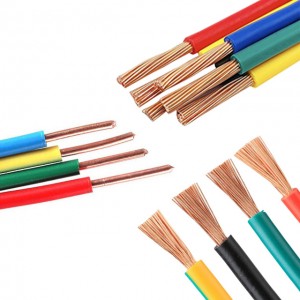Hard and soft wires are two distinct types of electrical wiring that differ in terms of their structure, application, and flexibility. Understanding the differences between these wires is crucial for choosing the appropriate type for specific electrical needs.
Hard wires, also known as solid wires, are made of a single, solid metal conductor such as copper or aluminum. The solid conductor provides excellent conductivity, ensuring efficient transmission of electrical signals. Hard wires are rigid and inflexible, making them suitable for permanent electrical installations where flexibility is not a requirement. They are commonly used in applications such as residential and commercial wiring systems, where they are installed within walls, ceilings, or conduit systems. Hard wires are also used in power cords and extension cords to ensure durability and safety.
One of the key advantages of hard wires is their durability. Their rigid construction makes them less susceptible to damage or breakage, providing a consistent and reliable flow of electricity. Hard wires are designed to withstand harsh environmental conditions and are often used in industrial machinery or heavy-duty electrical equipment. They can handle higher current loads, making them suitable for applications that require long-term stability and high power transmission.
In contrast, soft wires, also referred to as stranded wires, are made up of multiple strands of thin metal conductors, typically tinned copper or copper-clad aluminum. These strands are twisted or bundled together to form a flexible wire. Soft wires offer a higher degree of flexibility compared to hard wires, making them suitable for applications that require frequent movement or repositioning. They are commonly used in household appliances, electronics, telecommunications, and automotive industries.
The main advantage of soft wires is their flexibility, which allows them to be easily bent, twisted, or stretched without breaking. This flexibility makes them ideal for installations in tight spaces or in situations where movement is required. Soft wires are lighter in weight compared to hard wires, making them easier to handle and install. Their stranded construction also helps to reduce the risk of wire fatigue and breakage, ensuring a longer service life.
When it comes to installation, hard wires are typically installed during construction or renovation projects by running them through conduit systems or embedding them into walls. Their rigidity makes them suitable for fixed installations where durability is important. Soft wires, on the other hand, are commonly installed using connectors, plugs, or terminal blocks. This allows for easier assembly, repair, or modification as the wires can be quickly disconnected and replaced if necessary.
In summary, the primary difference between hard and soft wires lies in their flexibility, application, and installation method. Hard wires are rigid and suitable for permanent installations that require durability and high current handling. Soft wires, on the other hand, are flexible and ideal for applications that involve frequent movement or repositioning. Understanding these differences is essential for selecting the right type of wire that best meets the specific electrical requirements.
Email: sales@zhongweicables.com
Mobile/Whatspp/Wechat: +86 17758694970
Post time: Jul-04-2023







